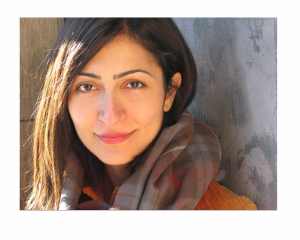TIMBUKTU
Salaam alaikum
Once, when I was a girl
I ni sógóma?
I believed in morning,
like a hot, yellow apple
Manda nabasheyn
We never tired. Father said,
God is good
Héré sira?
We slept in twos and threes
Famil chatoor ast?
It was a matter of everyone
Sómógó bédi?
Someone had work, someone didn’t
Someone always offered something
Owlada khoob astan?
We were kids but we knew everything
We belonged to everyone
I sigi na
After prayer, there was tea
After tea, there was fruit
Befarmayen
Mother taught us to draw our feet
To let others go first
Aw ni tile
In time, day gave way to night
Jan e tan jor ast?
Someone would show up asking for my body
Then another
I dógó cé ka kéné
We would exchange brothers
who were not our brothers
Khudaya shukur
The earth met us in different ways
For some, it rained
For others, there wasn’t water for the stones
A barika Allah ye
We thanked God for blessing us
and not our neighbors
Khuda hafez
History was the first to leave
and without a trace
Aw ni wula
Father said the night has hands
Mother reminded me of the apple
Shab bakhair
In the dark
I held nothing
A PLACE TO LIVE
It’s a place to live,
he said
looking out over the cranes
frozen in the sand
like seagulls with still wings
There was the glass whale
standing up in the water
a dolphin facing God
There was the cigarette skyline
blank-faced buildings
tall, white, and widowed
or blue and mirrored
hundreds of them
vacant
beaded gloriously gold at night
In between were low cubes of stores
car dealerships, jewelers
and invisible trades
There were shopping malls
with arches and sea life
supermarkets built for disasters
There were convention centers and expos
and festivals that began at sunset
There were museums for other places
There was the old city
with stout white blocks
bleeding with short brown men
who worked construction
There was sudden grass
bougainvillea on the walls
hyacinths in the sand
miles of manicured walks
blue ones and red ones
black-eyed peacocks
and falcons perched on covered hands
There was no trash
There were cars and cars and cars
big tires for the dunes
diamond caps for the night
and boys like him
laughing behind sealed glass
Everywhere
a cape of fine azure
Tall men and women
in white cotton
and black rayon
men with sinful watches
women with silver faces
who loved to shop
There was fresh fruit
bottled water
expats
pilgrims
and prayer on the side of the road
There was refrigeration
There was the Qasba
with its French seats
and flat desserts
a Ferris wheel called The Eye
We went up
and in the glow of the city
before I could say it,
he said,
this is where I grew up
Sahar Muradi is a writer and performer born in Afghanistan and raised in the U.S. She is co-editor, with Zohra Saed, of One Story, Thirty Stories: An Anthology of Contemporary Afghan American Literature and a co-founder of the Afghan American Artists and Writers Association. Her writing has appeared in Drunken Boat, dOCUMENTA, phati’tude, Green Mountains Review, elsewhere, and The Poetry Project Newsletter. She is the recipient of an Asian American Writers’ Workshop Open City Fellowship, the Himan Brown Creative Writing Award in Poetry, and a Kundiman Poetry Fellowship. Sahar has an MFA in poetry from Brooklyn College, an MPA in international development from New York University, and a BA in creative writing from Hampshire College. She lives in New York City.
Links to her work:
Elsewhere Literary Magazine http://www.elsewherelit.org/muradi/
Drunken Boat http://www.drunkenboat.com/db16/muradi-saed
dOCUMENTA13 http://d13.documenta.de/uploads/tx_publications/105_Muradi-Saed_01.pdf
On the Issues Magazine http://www.ontheissuesmagazine.com/cafe2/article/26
The Poetry Project Newsletter http://poetryproject.org/wp-content/uploads/PPNL-oct-nov-14-FINAL.pdf
